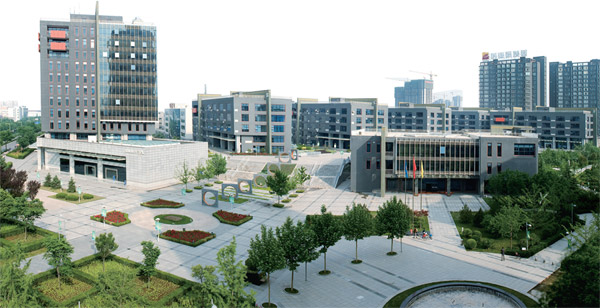 |
| A community of PhDs, returning talent and dreams. (Photo/ Ed Zhang) |
Yan Ling’s audience cannot help being amazed by the way she talks about her job.
She sounds like a high school teacher, but the people she works with are the ones with much higher academic degrees.
Some of them earned PhDs and worked for large companies in the West before they came back to China to start their own ventures.
Her position is the director at an industrial park in the city of Xi’an reserved for startups by people who studied abroad, one of the more successful “pioneering parks” in the nation.
But throughout her briefing session, she talks with big smiles and deep sighs about the stories of many private entrepreneurs as if they were her kinsfolk.
She is like a community worker in a special kind of community – one formed by “high-level talents”, as they are often termed in China.
In fact, the pioneering park where she works is a very important part of the Xi’an High-tech Zone in Shaanxi province, one of the few long-established industrial parks in China’s vast hinterlands qualified to host and service companies run by professionals and engineers-turned-entrepreneurs.
The park is also the government-financed incubator for all small technology companies, whether or not their leaders studied abroad.
The only difference, Yan explained, is that people who studied abroad can earn additional preferential policies.
As is typical in China, Yan said her “office has two names – because we perform two interrelated functions”.
The 38-member office now services 805 enterprises currently based in the pioneering park and serves as a liaison between startups, the Shaanxi’s provincial government and the XHTZ administration committee, which approves research grants, development subsidies and other preferential terms.
The office is not part of the provincial government. Nor is it an entirely independent social organization, even less a for-profit enterprise.
Such organizations are common in the various development zones in China. Called the government’s delegated agencies, they are designed to streamline administrative procedures for would-be investors by staying small and more service-oriented.
Administrators of the Xi’an pioneering park do not assign themselves many numerical targets.
“We don’t expect quick results. We don’t expect to get anything back from the people we help,” Yan said.
“There is no way to tell which companies are going to carve their niche and even become industry stars tomorrow.
“You can only be certain that some of them are going to fail. And through the years, we’ve seen quite a number of them actually fail,” she said.
Some startups still cannot manage to grow successfully after a few years of government assistance.
“Our job, as it is assigned by the state and the administrative committee (of the XHTZ), is just to provide our service to the hopeful winners,” she said.
“We don’t ask if they can really win, or after a few years, if they have really won.
“There are other companies that may benefit from what they do even if they lose. And the nation will benefit from them – at least their commitment.”
Rather than taking care of any particular company’s rise or fall, the role of the pioneering park is meaningful in helping Shaanxi, a province in the Chinese interior, gather increasing numbers of highly educated and experienced entrepreneurs.

 Mountain of garbage in Nairobi
Mountain of garbage in Nairobi Highlights of MAKS 2013 Int'l Aviation and Space Show
Highlights of MAKS 2013 Int'l Aviation and Space Show  10th China-ASEAN Expo opens in Nanning
10th China-ASEAN Expo opens in Nanning Eagle Boy takes to sky to break another record
Eagle Boy takes to sky to break another record 12-year-old boy becomes pillar of the family
12-year-old boy becomes pillar of the family Eye-gouged boy receives blind rehabilitation in Shanxi
Eye-gouged boy receives blind rehabilitation in Shanxi Top 10 naked hotels in the world
Top 10 naked hotels in the world The most gorgeous Chinese women in the eyes of foreigners
The most gorgeous Chinese women in the eyes of foreigners A collection of bizarre rooftop buildings around China
A collection of bizarre rooftop buildings around China Putin intimate contacts with marine animals
Putin intimate contacts with marine animals China's frigate 'Bengbu'in fire training
China's frigate 'Bengbu'in fire training Fresh students 'forced' to register in university independently
Fresh students 'forced' to register in university independently 2013 Taiwan Int'l Tourism Expo kicks off in Taipei
2013 Taiwan Int'l Tourism Expo kicks off in Taipei Photo story: Take a gap year
Photo story: Take a gap year Nokia's Global Headquarters: visiting a declining empire
Nokia's Global Headquarters: visiting a declining empireDay|Week|Month